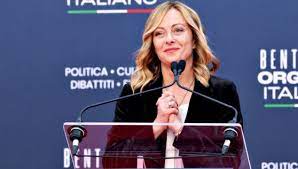Meloni, Le Pen rift mars far right’s prospects of wielding EU power

Paris/Rome – When a French minister compared Italy’s nationalist Prime Minister Giorgia Meloni last year to the leader of the French far right, the Italian premier rang French President Emmanuel Macron to complain.
Meloni was so incensed that the French leader felt compelled to send an emissary to Rome to appease her, said two sources with knowledge of the conversations.
The Italian premier’s message to Macron was clear, according to one of the sources: she was no Italian version of Marine Le Pen.
Both Macron’s and Meloni’s office declined to comment on the incident, which has not been previously reported.
Meloni’s anger illustrates the depth of divisions within Europe’s nationalist right that may stymie its efforts to wield power at an EU level despite record support ahead of European parliament elections in June, according to half a dozen sources with knowledge of their parties’ strategy.
Polls predict that Europe’s nationalist and eurosceptic parties will win a record number of votes in June. Voters are expected to punish mainstream parties for failing to shield households from high inflation, curb immigration and deliver decent housing and healthcare.
A model constructed by the European Council on Foreign Relations (ECFR), a policy think tank, using polls from EU countries forecast in January that a populist right coalition of the Christian democrats, conservatives and radical right could, in theory, emerge with a ruling majority in the European parliament for the first time.
But the prospect of a single, muscular bloc encompassing the far-right emerging is slim amid stark differences between its leading figures, Meloni and Le Pen, the sources told Reuters.
Meloni de facto leads the hard-right European Conservatives and Reformists (ECR) grouping within the parliament, while Le Pen is a driving force in the more overtly anti-EU Identity and Democracy (ID).
A merger between their two groups at the European parliament is highly unlikely because Meloni’s strategy, now she’s in power, is to maximise Italian influence within Europe by collaborating with EU institutions, not fighting them, the sources said.





